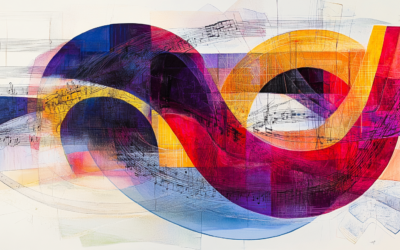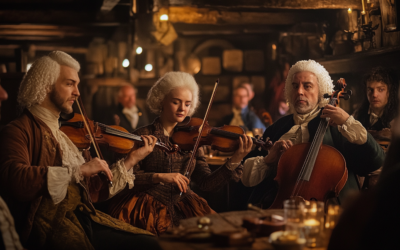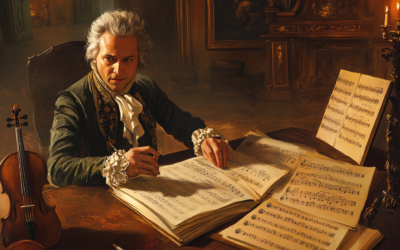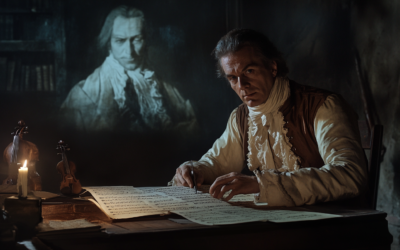Mozart's K 73A
A Mystery Wrapped in Ambiguity
The aria K 73A, listed in the Köchel catalogue as a work by Mozart, remains an enigma. With scant evidence, vague references, and no autograph to confirm its authenticity, one must wonder how such a piece earned a place in the prestigious catalog.
Mozart in Italy: The Untold Story
Was Mozart truly a solitary genius, or was he merely the instrument of his father’s ambition? “Mozart in Italy” challenges the conventional narrative, revealing a complex dynamic between father and son that shaped the course of music history. Prepare to question everything you thought you knew.
“When a name becomes a brand, the truth about its products tends to be obscured.”
Mozart in Italy
The aria “Misero tu non sei” (Wretched thou art not) is listed in the Köchel catalogue under Mozart’s name, yet little is definitively known about it. What we do know is that the text—”Misero tu non sei”—is borrowed from Metastasio’s Demetrio, a detail that leaves no room for doubt about the real author of the libretto. But the supposed composer? That’s where things get murky.
A lone reference in a letter dated January 26, 1770, where Mozart casually mentions starting the aria, offers no further clarification. Whether he was composing it for himself or copying it from his father remains entirely speculative. No manuscript has ever surfaced to authenticate Mozart’s authorship, and the aria’s precise instrumentation, key, and movements are as elusive as its origins. Yet, despite this glaring lack of solid evidence, it continues to hold its place in the official catalogue of Mozart’s works, under the designation K 73A.
Why, then, does this aria persist in being associated with Mozart? The answer likely lies not in musical innovation or compelling historical documentation, but in the strength of the mythos surrounding Mozart’s name. The absence of an autograph, the speculative nature of the evidence, and the questionable provenance should render this aria a footnote at best, yet it occupies an oddly secure spot in the annals of his supposedly vast oeuvre.
As is often the case with works attributed to Mozart, the true nature of this aria becomes less about its merit and more about its association with a figure whose name has, for centuries, been enshrined as the pinnacle of musical achievement—an association that may be more about preserving an image than accurately cataloguing historical fact. The inclusion of K 73A in the Köchel catalogue is less a testament to Mozart’s compositional prowess and more a reflection of the enduring power of Mozart’s legend, for which musical truth is often a secondary concern.
At the end of the day, Misero tu non sei may serve as yet another example of how Mozart’s name—regardless of the evidence—continues to overshadow the true origins of many pieces, a legacy built not just on music, but on myth.
You May Also Like
The Mysterious Case of Mozart’s Duets: An Unfinished Story
Mozart’s string duets have long been shrouded in mystery, from his father’s heavy influence in 1768 to his supposed act of charity for a dying Michael Haydn in 1783. These unfinished works reveal more about the composer’s life and struggles than they do about his musical genius.
The Misattribution of Mozart’s K.2 89a (K.6 73i): A Questionable Canon
K.2 89a (K.6 73i), attributed to Mozart, is riddled with issues—missing voices, incomplete harmonies, and even the absence of text. Should this piece really be in his catalogue?
The Borrowed Simplicity: Mozart’s Canons K.555, K.557, and K.562
The canons K.555, K.557, and K.562, often overlooked for their simplicity, reveal striking similarities with the works of Antonio Caldara. These three pieces, dated 1788, demonstrate how Mozart adapted and simplified Caldara’s contrapuntal structures, masking his influences while reflecting the galant style of the era.
Mozart’s Quartet of Lodi: A Dated Work with Many Influences
Mozart’s Quartet of Lodi is often praised as an early masterpiece. But was it really his own work?
Mozart’s Violin Pieces: Substitutes for Failed Movements?
Despite revisions, Mozart’s violin concertos remain flawed, while his minor pieces, K.261 and K.373, surprisingly garner more attention in his correspondence than his major works.
The Questionable Origins of Mozart’s Violin Concertos
Are Mozart’s violin concertos truly original? This article explores the possibility that the Czech composer Josef Mysliveček played a far larger role in their creation than previously acknowledged.







